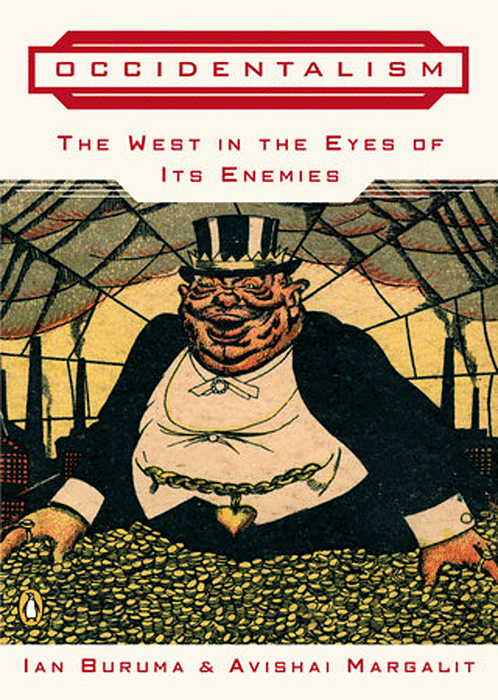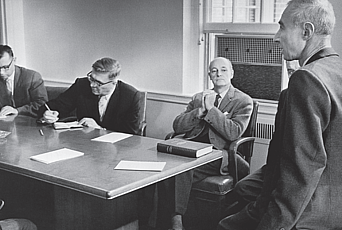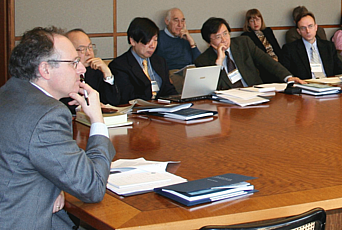Occidentalism, as defined by Avishai Margalit, George F. Kennan Professor in the School of Historical Studies, is a modern phenomenon, a dehumanizing picture of the West, painted not only by its enemies but in fact propagated from within. "Occidentalism is by no means the private domain of a particular non-Western civilization, whether Islamic, Hindu, Confucian or what have you," said Margalit. "Indeed, all the main outlines of the Occidentalist picture were drawn within the West and were exported from the West to other parts of the globe. A good metaphor for this is the trail of the colorful cloth that was produced in cheap Parisian factories to be exported to Tahiti only to bounce back, through Gauguin's paintings, as authentic local Polynesian dress."
In his book Occidentalism: The West in the Eyes of its Enemies with Ian Buruma (The Penguin Press, 2004), Margalit explored anti-Western stereotypes and traced their source to the West itself. Similar to Edward Said's conception of Orientalism, the classic work published in 1978 that describes how Europeans have long stereotyped non-Westerners as childish and irrational, Margalit and Buruma charge that the unflattering stereotypes that feed Occidentalism were perpetuated by Europe's intellectual rebels from the eighteenth, nineteenth, and early twentieth centuries.
Margalit explained during a recent Friends Forum that the Occidentalist picture of Westerners as machine-like creatures without souls stems in part from the contention “that the West at best has civilization but it has no culture.” Culture, Margalit continued, connotes “the deep-rooted creative force of life,” while civilization “ties with the idea of the city, and further tied with it are the ideas of being artificial, superficial, cold, mechanical, abstract, and schematic.”
The assumed clash between culture and civilization —which Margalit regards “as a figment of a fervent imagination rather than a description of anything real” —is an illusion that has been propagated by cultural pessimists in the West who believe “in the great divide between culture and civilization, and believe that they are caught—against their better judgment and against their will—on the wrong side of the divide.”
The danger is that Occidentalism is more than a stereotype, said Margalit, which “can and does feed ideologies of the most diverse kinds, from Maoism to various forms of political Islamism.” Even though Occidentalism is a modern picture, Margalit said, “some of its features areas old as the Bible. The idolatrous city is one of them. It can be Babylon with its rebellious tower, or it can be New York with its twin Trade Center towers. All we have to do is turn to Osama Bin Laden who, among other things, is a great believer in the doctrine of the clash of civilizations."
Margalit believes that the religious view of the West as idolatry is "an original contribution of political Islam to modern Occidentalism." According to Islamic political ideologues like Abu-l-A'la Maududi in Pakistan, Sayyid Muhamud Taleqani in Iran, and Sayyid Qutb in Egypt, we are now living in an era of New Jahilyya, meaning "the resurrection and evocation of the notion of Jahilyya understood as referring to the idolatrous barbarism of the West," Margalit said.
"In the current political Islam the idea of the New Jahilyya is meant to be used literally with all the political and religious implications that go with it––in particular, the command to put the wrong of the Jahilyya aright by its radical eradication," Margalit said. "This is more than a tough rhetoric. What these people have in mind is not just to spread Islam to the West but to eradicate the idolatrous West from the Islamic World. This is not an impossible political project. Being fed by an Occidentalist religious picture of the West as the source of the New Jahilyya, this project has the potential to become a true revolutionary ideology."
Margalit discounted the idea that Occidentalist talk is not serious talk––that "it is said but not believed" and is "mere manifestation of inferiority complex." Even if Occidentalism, in fact, is an effort to overcompensate for inferiority––the claim that "The Rest has inferiority complex vis-a-vis The West"––Margalit contended that, at best, it "can explain why the Occidentalists believe what they believe but not that they do not really believe it. I believe that Occidentalism is believed. And because of that, in revolutionary situations, Occidentalism can be a politically serious matter. The dehumanization of Occidentalism makes it also a serious moral problem."



